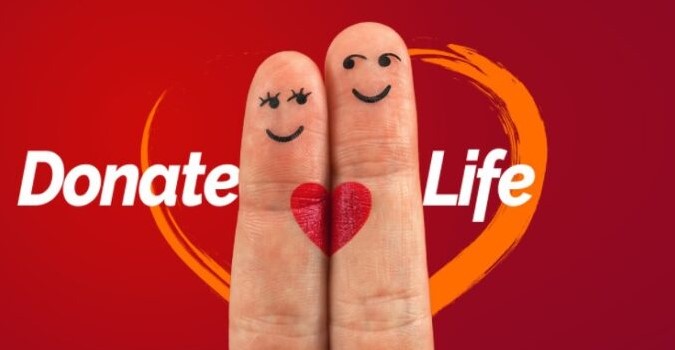
We want to save lives.
In Jewish law, saving a life is the highest fundamental value in Judaism. In fact, in order to save a life, one is ordered to transgress all the other commandments (except 3).
If you see a Jew driving on Shabbos, you can be heartbroken for them and feel bad that they are not so connected to Hashem and transgressing the Torah. However, once you know that they are rushing to save a life, your view suddenly changes, and you give the person all the respect for their holy work.
In Gemara Bava Batra 11:2 states:
כל המקיים נפש אחת מישראל כאילו קיים עולם מלא
Anyone who preserves a single life in Israel is regarded as if he has preserved an entire world.
There have been many and extensive campaigns by Jewish organizations to encourage people to donate organs, especially their kidney in order to save the lives of the sick.
People are also donating part of their liver, of which we only have one, blood donations and tissues for transplantation, such as skin, bone marrow and blood-forming cells (stem cells).
I have donated blood to the blood bank here in Israel, several times, especially on the day of my birthday in order to elevate my special day to Thank Hashem for my good health and of course, in hopes that my blood is used to help save lives.
In Israel, there are times when blood banks are full and donations are discouraged. This shows how great the Jewish nation is. I have seen people of all ages waiting in line to donate blood which the body replenishes over time.
I know a few people who donated their kidney to save the lives and were very happy doing so.
My nephew was just 20 years old, not even married yet, when he donated a kidney to a stranger. My brother-in-law, a father of a large family, donated his kidney to a stranger.
My sister-in-law’s sister donated a kidney and said that she would do it all over again if she had more kidneys to give away.
We were very inspired by them and others to save lives with organ donations.
This is not a light matter, and we sought a lot of guidance from our medical experts and rabbis.
Everyone knows that surgery is always risky. Organ donation is a major surgery which is physically very painful for the donor in addition to the anxiety and stress for the donor and their extended family, the husband, wife, children, father and mother.
In addition, while a person is alive, they themselves may develop a kidney issue, and due to being left with only one kidney instead of the two, they may need to go on dialyses.
After doing lots of research on this topic, the nagging question remained: donating a kidney appears to be a בזיון החיים disgrace for the living as they are suffering immensely, physically, emotionally and mentally, before, during and after undergoing the process, and they may suffer for the rest of their lives as a result.
We learned that there are lots of health risks involved such as reduced kidney function for the donors, painful recovery and/or life-long health issues.
We know that Hashem never makes mistakes and that everything He put inside our body is needed for our bodies to function at its best.
Hashem created us with two eyes, yet, you never hear someone say “I can see with one eye let me donate the second eye to a blind person. Why should I see so well when I can function and see perfectly well with one eye while the blind person cannot see anything?
This is because we can easy “see” the benefits of having both of our God-given eyes. However, with kidney we don’t “see” the benefits of our two kidneys while they are with Hashem’s help doing the job well within us.
We want to save lives.
According to the Mayo Clinic “The popularity of living-organ donation has increased dramatically in recent years as an alternative to deceased-organ donation due to the growing need for organs for transplantation and shortage of available deceased-donor organs. “The risks associated with living-donor organ donation include both short- and long-term health risks of the surgical procedure, organ function, and psychological problems following organ donation.”
Decreased kidney function means that your kidneys are not able to remove the toxins and waste products from your blood as well as someone with normal kidney function.
During our research and talks with Jewish experts and Rabbis who are very well versed in the Torah law of organ donations both living-donations and after-death donation, we discovered that after-death donations is done quickly and with the supervision of a rabbi who is well versed in these specific laws. It is done as quickly as possible without delay, so the deceased can be buried in a timely manner as usual and causes no physical pain to the deceased.
While a living donor may need the organs during their life-time the deceased will never need them again.
In addition, instead of organs dying and rotting after burial, the organs are removed and given to other people in need, allowing the donor to save several lives at the same time, and leaving parts of their bodies here in this world to continue doing mitzvahs on their behalf.
The one argument we heard repeatedly from ultra-orthodox Jews is that donating a kidney (or any other organ) after death is a בזיון המת disgrace to the dead because it is not OK to be buried with missing organs. However, not one of them were able to explain why this is any different from the living-donor who will also be buried with a missing organ which they gave away during their life-time.
Their second argument is that removing the organs delay the time of burial, and this is בזיון המת.
The answer is that the there is no delay in the process, and just the opposite, this is כבוד המת respect to the dead, as this will add to the merits of the deceased and every good deed done by the person/people who receive the organs are added to the portion in the world to come of the donor.
After-life donation is the way to go, and it seems to be the greatest כבוד המת.
May Hashem grant us all long and healthy lives, and may no one be in need of an organ.


